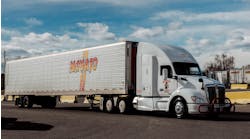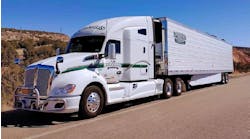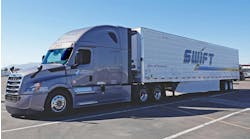German transportation and logistics company Dachser recently began testing four battery-electric refrigerated trailers in Erlensee, Hamburg, and Langenau, in an effort “to gain important experience” with the evolving technology.
The Krone reefers feature components designed to reliably cool the “eTrailers” for longer periods of time, including modern, high-efficiency transport refrigeration units (TRUs), lightweight batteries with a capacity of 23 kWh, and regenerative axles. The batteries charge within 3-4 hours at loading gates, where pre-cooling also takes place, the companies said.
No extra charging infrastructure is required to run the eTrailers, which are lighter than fully equipped diesel-powered reefers, Krone added.
“With the first four eTrailers in the Dachser network, we now have the opportunity to put the technology through its paces in everyday operations,” Tobias Ritter, Dachser Food Logistics department head for production and network processes, said in a news release. “When transporting food, the cold chain must never be interrupted.
“Therefore, the refrigeration must always function reliably, the ranges must be stable, and longer downtimes must also be possible … when delivering to commercial warehouses or in traffic jams.”
In addition to the batteries, the generator axles supply kinetic energy for cooling. When the trailers are traveling more than 20 kilometers per hour (12.4 miles per hour), the generator axles supply enough power to operate the cooling systems “completely independent” of the TRU batteries, while also charging them, Krone said.
Fully charged batteries keep trailers cool for 5-6 hours, the company added.
Dachser’s goal is to improve its carbon footprint in food transport while also reducing the noise produced by diesel TRUs. It’s plan is to run test scenarios, including shuttle services, local journeys, and long-distance routes.
“Together with our long-standing trailer partners, Krone [vehicle manufacturer], Krone-Fleet [trailer rental company] and Carrier Transicold [refrigeration unit], we are deliberately taking the step of testing new technologies in live operation,” said Christian Schütz Dachser department head for technical purchases.
“We have been doing this successfully for many years with our towing units.
“In the future, we want to deploy even more of these units to support our climate protection goals. In addition to the operational issues when deploying them in our branches, also economic factors play a special role for the purchase and maintenance of these trailers, which we will verify in detail in test operations.”



